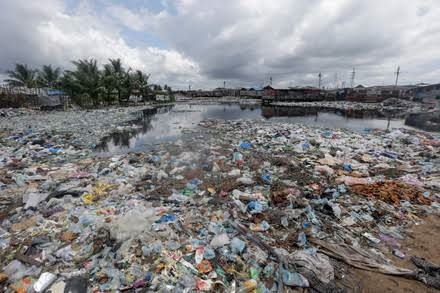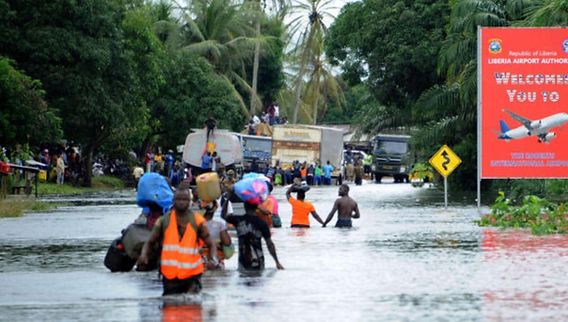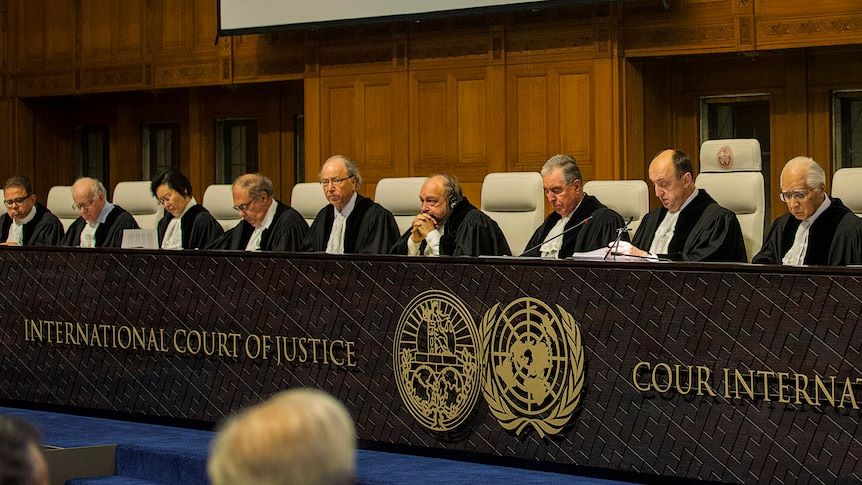PHOTO: Jurists of the International Court of Justice
A COMMENTARY By Alfred H. W. Brownell, a Law Graduate, Legal Researcher, Writer, Environmentalist and a Concern Citizen
On July 23, 2025, the International Court of Justice (ICJ) released its first-ever advisory opinion on climate change, launched by Vanuatu’s ICJ Initiative and supported by 132 co‑sponsors.[1] Drawing on an unmatched record 91 written submissions and 62 comments, the Court confirmed that greenhouse gas emissions (GHG) violate international law via both treaty and customary obligations. It declared that a clean, healthy, and sustainable environment is a human right, and that countries including Liberia may face consequences for failing to act and enforce its environmental duties.
The Jurisdiction of the ICJ
The ICJ’s advisory opinions are judicial statements on legal questions submitted to the Court by organs of the United Nations. other legal bodies and made pursuant to article 96 of the United Nations Charter[2] and Articles 65 to 68 of the ICJ Statute[3].

Illegal solid waste plastic pollution
Unlike judicial decisions in contentious cases pursuant to article 36(1) and article 36(2) where the consent of State parties to the dispute forms the basis of the ICJ’s jurisdiction, advisory opinions do not require the consent of any State. Thus, advisory opinions do not constitute a decision within the meaning of Article 94 of the UN Charter or Article 59 of the ICJ statute.
Liberia is one of the United Nations members countries that has accepted the compulsory jurisdiction of the ICJ which took effect on March 3, 1952. Of those countries the majority have made reservations of various types to the jurisdiction of the ICJ.
Legal Analysis
The gavel has fallen in The Hague, and its sound should echo across every capital in not just Liberia but across the globe. In the historic advisory opinion, the International Court of Justice (ICJ) has done what decades of climate conferences could not: it has framed climate inaction as a matter of law, not politics.
The Court’s opinion makes one point resoundingly clear; Liberia is not merely encouraged to act; it is legally obligated to prevent climate harm. This includes safeguarding the environment, protecting vulnerable communities, and ensuring that
the present does not rob the future generations of their chance to thrive. It is a profound statement. But is it enough? And will the government listen?
Environmental principles provide a normative framework by creating a platform of consistent norms and expectations that apply across various legal instruments and sectors covered by the Environmental Protection and Management Law of Liberia. the ICJ Advisory Opinion offers few aspects on how international environmental law obligates Liberia in and other countries in respect of Climate Change. The advisory opinion offers a convincing and plain language expression of binding erga omnes obligations under international treaties and customs to which Liberia is a party.

Flooding in Monrovia
The breach of which will attract an array of remedies under the Environmental Protection and Management law of Liberia citing government responsibilities, where causation will not be a hindrance or barrier.
On treaty obligations, the ICJ disagrees with high-emitting States party’s argument and held that all members of the United Nations have binding obligations to the UNFCCC, Kyoto Protocol and the Paris Agreement, including other customary and international human rights law.[1] The Court noted that 1.5C is the legally binding temperature target under the Paris Agreement and international law.[2]
These obligations include actions, conduct, due diligence,[3] enactment of laws, policies, allocation of resources, to prevent, investigate, punish, and provide reparation for violations under the principle which acknowledges that all states are responsible for addressing global environmental problems, albeit not equally and the UNFCCC, as such developed countries have higher obligations to prevent the climate crisis.
The ICJ was conspicuous in its call to all countries to adopt policies and mitigate GHG emissions; by regularly publishing national GHG emissions[4] under Paris Agreement. This call ousted the illusion that Paris Agreement is not a binding treaty, when it mandated the development of the Nationally Determined Contributions to reduce greenhouse gas emissions[5] and adapt to the impacts of climate change provided under article 4, paragraph 8, of the Paris Agreement.[6]
The ICJ further noted, all countries, Liberia included has binding obligations on adaptation, not just to develop polices on adaptation and planning but to implement such policies and cooperate in good faith and with due diligence[7]; while urging developed countries that they have obligations to provide financing to developing countries especially least developed and pacific islands countries.[8]
The International Court of Justice (ICJ) discussing customary international law obligations, particularly the “duty to prevent” and “duty to cooperate” in the context of climate change, [9] said these obligations are based on the principle that a general practice accepted as law by states, combined with the acceptance of that practice as legally binding, forms customary international law which duty applies to the harm caused by GHG emissions[10], and countries must use all means at their disposal to prevent such harm.[11]
The ICJ in fulfillment of the obligation of prevention through regulatory mitigation mechanisms and engaging with private actors urged countries to enact laws and adopt effective enforcement against private actors in form of strict liability of private actors for specific hazardous activities.[12]
The International Court of Justice (ICJ) emphasized that the duty of due diligence for states to prevent transboundary harm, particularly in the context of climate change, is not static and increases with scientific and technological advancements and the recognition of emerging risks to assess harm probability.[13] This means that states must adapt their preventative measures and risk assessments to stay ahead of potential harms, especially those related to environmental damage because as due diligence increases scientific certainty so too the risk increases[14]
The Court further affirmed that countries have a legal obligation to prevent significant harm to the environment, including the global climate system, and that this obligation is intrinsically linked to the duty to cooperate in addressing climate change requiring good faith, continuous and sustained forms of collective action.[15]
The advisory opinion on climate change also highlighted other obligations, emphasizing that states obligation extends beyond specific climate change treaties and encompasses customary international law, human rights law, and other relevant environmental treaties and UNCLOS[16] which is a precondition for the enjoyment of all other rights, including right to life[17] and to take necessary measures and implement domestic law to regulate private actors.[18]
Remarkably, the court affirmed that a breach of any of these obligations not only constitutes an internationally wrongful act entailing responsibility,[19] but that the primary wrongful act is the failure to protect the climate from harm.[20]
Furthermore, the court averred causation is predominantly linked to issues relating to reparation,[21] not to the determination of each country responsibility and standards concerning the nexus of causation in the context of climate change.[22]
The court mind blowing aspect of the opinion is when the court held obligations to protect the climate system are erga omnes obligations,[23] and thus any country such as Liberia may invoke responsibility of bigger countries for violation, and only those affected and impacted countries can file proceeding claiming reparations[24] within the framework of international law, when they have suffered harm due to wrongful actions. This can involve seeking compensation for damages, restitution of property, restitution, satisfaction[25]and other forms of remedies including or monetary compensation.[26]
The Court equally noted, China and India are not essentially developing countries, but their status varies based on prevailing circumstances.[27] This initiates a process where impacted countries can institute legal proceedings to hold someone accountable for their legal responsibilities, seeking damages and liabilities.
However, countries that become displaced by the climate crisis will maintain their full sovereignty and maritime boundaries[28] despite their displacement.
What’s In It for Liberia?
As Liberia celebrates 178 years of independence since July 26, 1847, the last 20 years of post-civil war climate discourse has been dominated by government’s inaction to protect the environment and commitments to fighting climate change which has been diluted with political and personal interests. Whether in Liberia or elsewhere, the ICJ has broken from that cycle of ambiguity. By grounding its opinion in principles of international law. Article 7 of the Liberian constitution encourages the doctrine of maximum feasible participation in the management of the economy and its natural resources.[29]
The Environmental Protection and Management Law of Liberia is the key legal instrument for managing the environment. Generally, it regulates sustainable or wise use of the natural resources[30]; use and conservation of the environment and natural resources; restoration, protection, and the conservation of biological diversity; preservation of the historic, cultural, sacred sites, waste management, water quality and pollution control among others.[31]
The most important regulatory mechanism created by this centrepiece of legislation is the mechanism for balancing development and environment concern through the imposition of obligations for the conduct important obligations for environmental impact assessment (EIA).[32]
Sections 105-109 of the EPML create offences for providing false information relating to environmental impact assessment, records, restoration orders, bodies corporate, and forfeiture. Section 112 imposes a general penalty not exceeding 10 years imprisonment or a fine not exceeding $25,000 USD or both. Liberia is obligated and responsible to prevent environmental harm and protect its human rights duties. Climate action is no longer a choice for the Liberian government; it is a duty says the ICJ.
Even right here in Africa, in an unprecedented legal initiative, a coalition of African civil society groups recently in ARUSHA, Tanzania filed a historic petition to the African Court on Human and Peoples’ Rights seeking an Advisory Opinion on the human rights obligations of African states in the context of the climate crisis.
This legal framing is a wakeup call to the Liberian judiciary, activists, and other vulnerable communities especially the youth and physically challenged to hold the government and its concession partners accountable. It is an empowerment tool which reinforces climate litigation, secure climate finance technology transfer, and education at all levels.
It encourages the Liberian legal community to evolve and judges to be innovative and progressive. The opinion is a challenge to law schools to rethink the current model of the law programs that take cognisance of global developments and the increasing emphasis on internationalisation. We believe the current curriculum require significant changes especially in a review of law subjects, their assessments and content to address issues of environmental degradation.
We call on the Liberian National Bar Association and the local county Bars to recognize this opinion by issuing policy statements in support thereof. Additionally, our courts must interpret climate inaction not as poor governance, but as a breach of constitutional and international obligations.
The ICJ’s convincing interpretation of the law sends a sobering message to governments that hope to hide behind vague targets or voluntary goals, encouraging citizens that whoever Liberians elect to power, they deserve answers on climate before they vote at the ballot box to shape the future for our kids, their kids, and generations to come.
The fact that the court decision was unanimous is a win for the climate, innovation, progressivism, this enhances substantially to the strength of this judgement now and in the foreseeable future.
A Moral Victory with Legal Consequences
Climate change is not an abstract issue for the future generations of Liberia. It is a lived reality now. From devastating floods that in 2017 left more than 100,000 people affected to more than 800 homes and 6,500 people being displaced in communities like West Point, and severe coastal erosion in Buchanan, Greenville, Harper, Robertsport, to illegal exploitation of natural resources, Liberia environment is screaming. And for thousands of Liberians in these vulnerable communities with pending disaster, climate change is a death sentence they did not write.
The ICJ opinion is, in many ways, a moral victory and a declaration that the Liberian government failure to protect the environment and act on climate change is not just irresponsible, but unlawful. The advisory opinion enshrines intergenerational equity as a principle, affirming that the government present priority and preferences cannot deny our children a profound nature experience and spiritual necessity for the growing up.
Our children have the right to connect with nature and to a healthy environment, it begins by recognizing more than 2 decades post war adverse consequences for both healthy child development and our stewardship for nature and the environment.
But moral victories alone do not protect the environment. They do not stop government from awarding concessions without free prior informed consent or transparency in the extractive resource sector. That requires political will and economic transformation on a scale that respect the rule of law, environmental laws and regulations all included.
Will Liberia Sink or Stand on Climate Ineptitude?
The ICJ has done its part. The next move belongs to the Liberian people, their representative, senators, courts, and scientific community. Advisory opinions have a strange power, whilst unenforceable, they can shape rules, guide environmental policy development, and tilt the balance in environmental litigation. Already, in Liberia resource communities who depend on their land for their livelihood are suing corporations and government is failing to protect them. This opinion strengthens indigenous communities across Liberia who were dispossessed of their customary land, cultural sites, and livelihoods by companies like Salala Rubber Corporation (SRC), Bea Mountain Mining Company, Western Cluster Liberia Limited (WCL) and several others.
This historic opinion is a tool for accountability. It gives hope to affected communities whose government fails to act or contribute to the harm, to seek remedies, and they can be held liable and may be held internationally responsible. Vulnerable communities across the country can now petition the Liberian Human Rights Commission and demand stronger commitments from the government not as a government policy checkbox, but as a matter of legal duty.
The government of Liberia has been warned. The law has spoken and the ICJ has drawn the map under jurists like Yuji Iwasawa, Hilary Charlesworth, Leonardo Nemer Caldeira Brant, Sarah Cleveland and Bogdan Aurescu. The ICJ has confirmed that the issue of climate change is not just an environmental obligation but also a legal and human rights requirement. As Liberia is developing its third Nationally Determined Contribution (NDC 3.0) we must maintain and enhance our climate commitments (64% emission reduction by 2030). We must act responsibly, seek support, and use this opinion to strengthen our global climate advocacy. The NDC 3.0 development offers a critical opportunity to localize the ICJ’s opinion by embedding gender justice, youth inclusion, and a just transition framework. Climate policy must move beyond paper and recognize the lived experiences of women in Agriculture, young climate advocates, and rural communities that are the frontliners.
This ruling isn’t just an important legal decision; it pushes us to reconsider our responsibilities. It urges lawyers, judges and lawmakers in Liberia to see inaction on environmental issues as a serious failure, rather than just delay in policy.
In a country where land, forests, and coastlines are sacred to identity and survival, this legal framing is a tool to ignite both courtroom advocacy and legislative reform. The question that lingers is will Liberia follow, or will it sink? For the ICJ, this decision is truly outstanding and remarkable. Now we look forward to the African Court on Human and Peoples’ Rights for Advisory Opinion. The time is running out!
About the Authors
Alfred H. W. Brownell is a Law Graduate, Legal Researcher, Writer, Environmentalist and a Concern Citizen.
Cianna P. Smith is an Attorney-at-law with interest in International Law, Climate Governance and Social Justice. She is passionate about advancing legal solutions for sustainable development and empowering vulnerable communities through policy reform.
Disclaimer: This article is a commentary, intended for general educational purposes only. The views and opinions expressed in this article are those of the authors and do not necessarily reflect the official policy or position of any institution or political party, nor the official position of any research institutions in which they are affiliated.
[1] Vanuatu ICJ Initiative available at https://www.vanuatuicj.com/resolution
[2] See Chapter XIV — The International Court of Justice, article 96 available at https://www.un.org/en/about-us/un-charter/full-text
[3] Statute Of The International Court Of Justice, Chapter IV Advisory Opinions articles 65 to 68 available at https://www.icj-cij.org/statute
[1] Ibid, at [171].
[2] Ibid, at [224].
[3] Ibid, at [218, 280-300].
[4] Ibid, at [203].
[5] Ibid, at [315].
[6] Ibid, at [184].
[7]Ibid, at [262].
[8]Ibid, at [227, 264].
[9] Ibid, at [131, 272-300]
[10] Ibid, at [80, 298].
[11] Ibid, at [457(B) (a)]
[12] Ibid, at [160]
[13] Ibid, at [283].
[14] Ibid, at [293].
[15] Ibid, at [271-315]
[16] Ibid, at [336 -367].
[17] Ibid, at [372, 373, 393].
[18] Ibid, at [428].
[19] Ibid, at [444]
[20] Ibid, at [406].
[21] Ibid, at [433-438]
[22] Ibid, at [436].
[23] Ibid, at [440].
[24] Ibid, at [443].
[25] Ibid, at [444-455]
[26] Ibid, at [[451]-[454].
[27] Ibid, at [226].
[28] Ibid, at [363].
[29] Liberian Constitution (1986), article 7.
[30] Environmental Protection and Management Law of Liberia (2003), section [77, 83-85, 90].
[31] Environmental Protection and Management Law of Liberia (2003), section [4].
[32] Ibid, sections [6-33].

